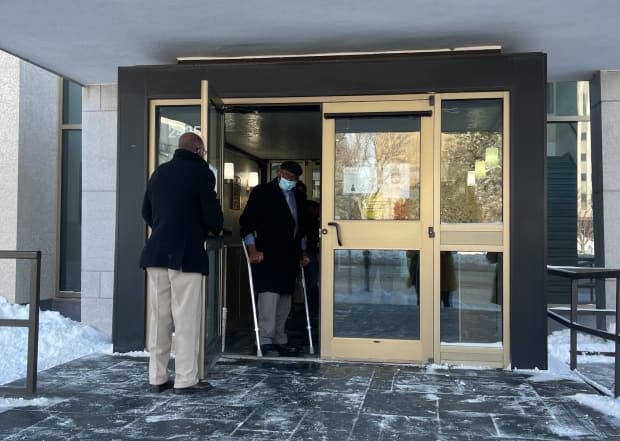Crown, defence argue over admissibility of potential expert witness in Ukabam trial

WARNING: This story contains disturbing details.
The sexual assault trial of a former Regina doctor entered its sixth day at Queen's Bench on Monday. Court heard from a professor of gastroenterology and practicing gastoenterologist — a potential expert witness.
However, the Crown and defence debated his admissibility.
The accused, 76-year-old Sylvester Ukabam, was also a gastroenterology specialist — a doctor who deals with disorders of the stomach and intestines.
He has pleaded not guilty to seven counts of sexual assault.
Monday's witness, Dr. Barry Lumb, is a professor at McMaster University in Hamilton, Ont. Throughout the course of his time on the witness stand, he is intended to provide opinion evidence with respect to gastroenterology. This includes evidence on diagnosis, patient examination, endoscopic procedures, treatments, patient care and professional standards and responsibilities.
As of Monday, Lumb has yet to be officially admitted as an expert witness. As such, any testimony given during Monday's proceedings could be inadmissible as evidence if he is ultimately not admitted.
Five complainants
The trial of Ukabam began on Jan. 10 with a witness who said the former doctor put pressure on her vagina under the pretence of conducting a physical examination in 2013. On Jan. 11, the second complainant testified that Ukabam sexually assaulted her on three separate occasions between 2012 and 2014. She said two of the occasions included vaginal penetration.
On Jan. 12 the third complainant said Ukabam sexually assaulted her with vaginal penetration in 2017.
On Jan. 13 court heard from a friend of Jan. 12's witness, who testified to how the witness acted on the day of her alleged assault.
Later on Jan. 13, court heard from a fourth complainant who alleged that Ukabam performed an unusual and unnecessary breast exam on her at his downtown clinic without explaining why.
And on Jan. 14, court heard from a fifth complainant — a 66-year-old woman from Regina with Crohn's disease— who alleges that Ukabam sexually assaulted her on June 23, 2014, during a routine appointment.

38 years of experience
During voir dire on Monday, Lumb detailed his 38 years of experience in the field of gastroenterology. This included overseeing the training of medical professionals as well as examinations.
When asked, he said that as part of his practice he addresses non-cardiac chest pain, Crohn's disease, colitis and celiac disease in patients.
The Crown also asked Lumb how he prepared for the trial. He said he was given access to police interviews, complainants' medical records and reports to the College of Physicians and Surgeons of Saskatchewan.
The Crown asked Lumb about sedation. He testified that endoscopic procedures are typically done under sedation, whether that be conscious sedation, where the patient is awake, or deep sedation, where the patient in unconscious.
Lumb said that generally conscious sedation is provided by the gastroenterologist. He said he has regularly used sedation throughout his career.
The Crown then asked Lumb if he is commonly asked to perform breast examinations. He responded no.
Lumb said he had no connection to the complainants, nor had he been aware of Ukabam prior to the trial.
Finally, Lumb confirmed that he had written five reports, one for each alleged victim.

Cross-examination
During cross-examination, Ukabam's lawyer Aaron Fox questioned Lumb about the wording and phrasing he used in his drafts of the reports as well as the final reports themselves. Fox suggested Lumb's wording was too emotional, and favoured the testimony of some of the complainants.
"Isn't it pretty obvious that you are commenting on the veracity of the patients and why they should be accepted? Isn't that clear?" said Fox.
Lumb said he reported as impartially as he could to the best of his ability.
The defence asked the witness if he had looked into Saskatchewan-specific rules when it comes to professional medical standards. Lumb said he did not, but remarked, "This is [a] universal expectation."
During the Crown's re-examination of the witness, Lumb was asked if his emotional response to the complainants' incidents contributed to his medical conclusions or whether the incidents were appropriate.
He said no and that he could remain objective.
The defence suggested that previous drafts of his reports, as well as some of his answers to questions during Monday's proceedings, showed that he could not remain impartial. The Crown argued that he could, and was simply a newcomer to expert witnessing at criminal trials.
The arguments were noted by Queen's Bench Justice Brian Scherman, who will make a decision on whether to admit Lumb as an expert witness. He adjourned the court until 10 a.m. on Wednesday, to give himself time to come to a decision.


